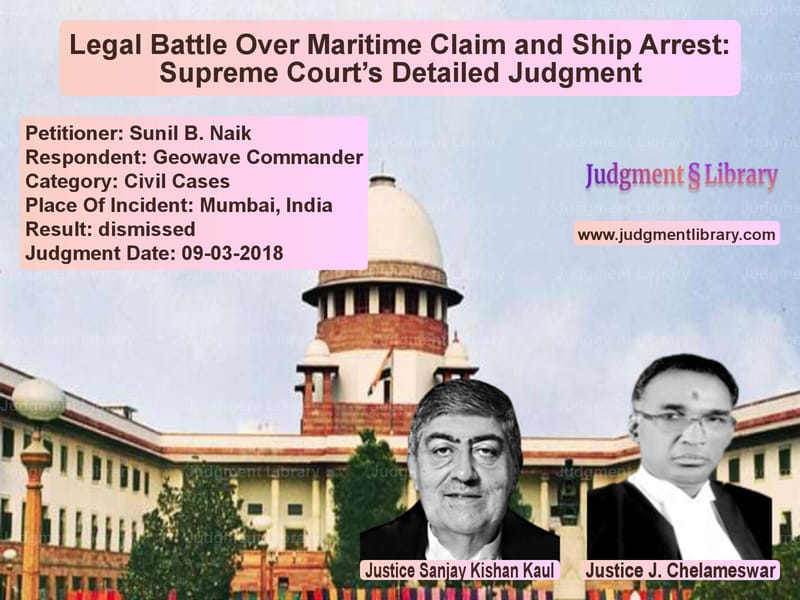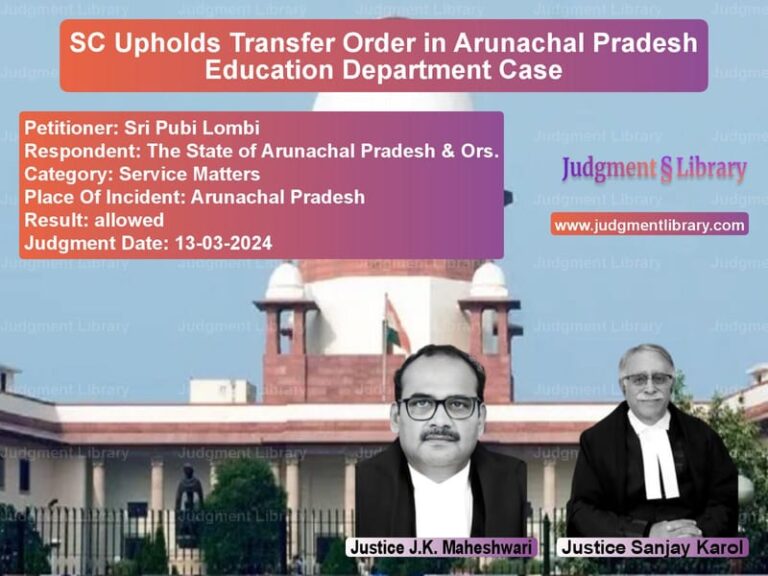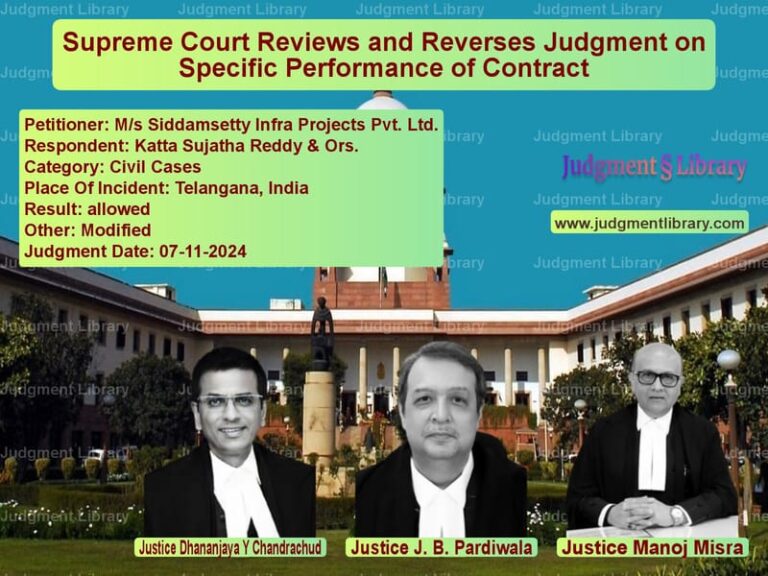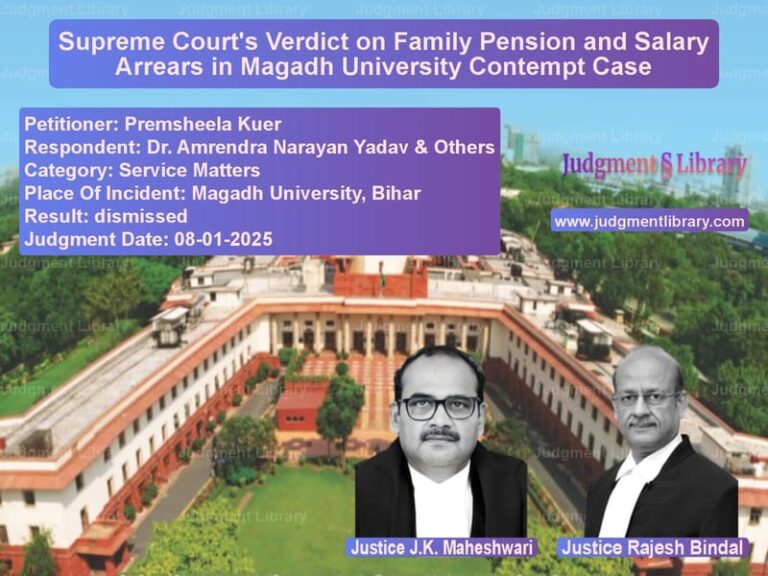Legal Battle Over Maritime Claim and Ship Arrest: Supreme Court’s Detailed Judgment
The case of Sunil B. Naik vs. Geowave Commander is a significant ruling in maritime law, addressing the scope of admiralty jurisdiction, the concept of maritime claims, and the rights of ship owners versus charterers. The Supreme Court was tasked with determining whether the petitioners, who provided services under an agreement with a charterer, could enforce their claims by arresting a vessel owned by a third party.
At the heart of the dispute was the legal question of whether a vessel, not owned by the defaulting party but only under a bareboat charter agreement, could be subjected to an arrest to satisfy outstanding claims. The Court’s decision has set an important precedent in maritime law.
Background of the Case
The case arose when the Oil and Natural Gas Corporation Limited (ONGC) awarded a contract to Reflect Geophysical Pte. Ltd. for carrying out seismic survey operations off the coast of Gujarat in 2012. Reflect Geophysical, in turn, entered into a bareboat charter agreement with Master and Commander AS Norway to hire the vessel ‘Geowave Commander’ for three years.
The vessel was a specialized ship, equipped for seismic survey operations. Under the agreement, Reflect Geophysical had control over the vessel but did not own it. The agreement provided the charterer with the option to purchase the vessel at the end of the charter period.
In furtherance of its contract obligations, Reflect Geophysical entered into agreements with Sunil B. Naik and Yusuf Abdul Gani to provide additional vessels to support the survey operations. Sunil B. Naik agreed to supply 24 fishing trawlers as chase vessels, while Yusuf Abdul Gani provided the vessel ‘Orion Laxmi’ for standby and towing services.
Despite the agreements, Reflect Geophysical failed to make the payments to both Sunil B. Naik and Yusuf Abdul Gani, leading them to initiate legal proceedings to recover their dues.
Petitioners’ Arguments
The petitioners contended that:
- They had valid maritime claims under admiralty jurisdiction.
- They provided services essential to the operation of Geowave Commander.
- Since Reflect Geophysical was in full control of the ship under a bareboat charter, the vessel should be arrested to satisfy the outstanding dues.
They relied on international conventions, such as the 1999 International Convention on Arrest of Ships, to argue that their claims fell within the ambit of maritime claims.
Respondents’ Counterarguments
The respondents opposed the arrest of the vessel, arguing that:
- Reflect Geophysical was only a charterer and not the legal owner of Geowave Commander.
- Under maritime law, a shipowner cannot be held liable for the debts of a charterer.
- The petitioners’ claim was against Reflect Geophysical, not the actual owners of the ship.
They argued that an action in rem (against the ship) was not valid because the vessel was not owned by the party liable for the debt.
Supreme Court’s Analysis
The Supreme Court examined the nature of the bareboat charter agreement and distinguished between de facto and de jure ownership. The Court cited various precedents, emphasizing that mere control of a vessel under a charter agreement does not equate to legal ownership.
The Court observed:
“The crucial test would be of ownership, which in the present case clearly does not vest with Reflect Geophysical, and the de facto ownership under their bareboat charter cannot be equated to a de jure owner, which is necessary for an action in personam.”
The Court further referenced the 1999 Arrest Convention, which allows for ship arrest only when the ship is legally owned by the party liable for the maritime claim.
Key Legal Findings
- The bareboat charter agreement gave operational control but did not transfer ownership to Reflect Geophysical.
- The petitioners had a claim against Reflect Geophysical, but not against the ship’s owner.
- Under maritime law, a vessel can be arrested only if it is legally owned by the debtor.
- The petitioners’ claims should be pursued against Reflect Geophysical through arbitration or other legal avenues.
Final Judgment
The Supreme Court dismissed the petitions, ruling that the arrest of the vessel was unjustified. The interim deposit of Rs. 1 crore, which had been made by the respondents as security, was ordered to be refunded.
The Court concluded:
“The appellants have neither any agreement with the owners of the respondent vessel nor any claim against the respondent vessel, but their claim is on account of their own vessels hired by the charterer of the respondent vessel. There is no claim against the owners of the respondent vessel.”
Key Takeaways from the Judgment
- Ownership Matters: A vessel cannot be arrested for debts incurred by a charterer if the ship is owned by a third party.
- Maritime Claims Must Be Against the Legal Owner: A valid maritime claim requires a direct connection between the claim and the ship’s owner.
- Enforcement Through Proper Channels: The petitioners should have pursued their claims against Reflect Geophysical rather than attempting to arrest the vessel.
- International Conventions Guide Decisions: The Court relied on principles from the 1999 Arrest Convention to determine the validity of the arrest claim.
The ruling reinforces fundamental principles in admiralty law and clarifies the conditions under which a vessel can be subjected to arrest for a maritime claim.
Petitioner Name: Sunil B. NaikRespondent Name: Geowave CommanderJudgment By: Justice Sanjay Kishan Kaul, Justice J. ChelameswarPlace Of Incident: Mumbai, IndiaJudgment Date: 09-03-2018
Don’t miss out on the full details! Download the complete judgment in PDF format below and gain valuable insights instantly!
Download Judgment: Sunil B. Naik vs Geowave Commander Supreme Court of India Judgment Dated 09-03-2018.pdf
Direct Downlaod Judgment: Direct downlaod this Judgment
See all petitions in Contract Disputes
See all petitions in Damages and Compensation
See all petitions in Specific Performance
See all petitions in Judgment by Sanjay Kishan Kaul
See all petitions in Judgment by J. Chelameswar
See all petitions in dismissed
See all petitions in supreme court of India judgments March 2018
See all petitions in 2018 judgments
See all posts in Civil Cases Category
See all allowed petitions in Civil Cases Category
See all Dismissed petitions in Civil Cases Category
See all partially allowed petitions in Civil Cases Category







